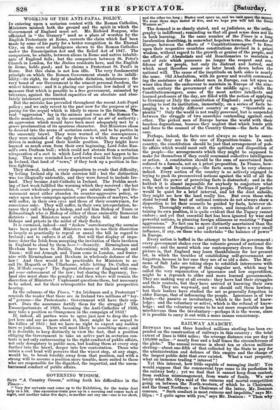WOVICING OF THE ANTI-PAPAL POLICY.
Ix entering upon a sectarian contest with the Roman Catholics, Ministers mistook both the ground and the spirit in which the Government of England must act. Mr. Richard Burgess, who officiated, in " the Granary" used as a place of worship by the English Protestants at Rome, corrects the claim which had been made by some of his party for a better recognition in the Eternal City, on the score of indulgence shown to the Roman Catholics under the Emancipation Act and the Relief Act of 1847. The comparison, he admits, between aliens in Rome and native inhabit- ants of England fails; but the comparison between St. Peter's Church in London, for the Italian residents here, and the English in Rome, holds good; and he claims a Protestant St. Paul's in Rome. But this claim is not less idle. The very fundamental principle on which the Roman Government stands is its infalli- bility—its right, its duty of absolute dictation, intolerance ; the very boast of our Government is the utmost personal freedom, the widest tolerance : and it is placing our position low indeed if we measure that which is possible to a free government, animated by tolerance, against the limited capacities of an absolute and abso- lutely intolerant government.
But the mistake has prevailed throughout the recent Anti-Papal .policy ; and we only revert to the past now for the purpose of e- paring for the sequel which is likely to ensue in the faun. real "aggression" lay in the animus and tone of the Roman Ca- tholic manifestoes, and in the assumption of an air of authority ; an aggression which would have been most adequately met by a grave proclamation of its spurious character. But Ministers chose to descend into the arena of sectarian contest, and to be parties in the unseemly brawl. They were warned of the consequences ; they were reminded of the ugly devices to which they would be driven in making good their hostile position. They might have learned as much even from their own beginning, Lord John Rua- KIPS own Durham bull ; which could not abstain from a sectarian -vituperation of a sect to which Lord John does not happen to be- long. They were reminded how awkward would be their position in Ireland, that land of "rows," if they took up a position in fac- tion-fighting.
They showed, indeed, every disposition to evade that difficulty, by letting Ireland slip in their coercion bill ; but the distinction was too illogically untenable, and they were forced to include Ire- land. They became Anti-CAholic in Ireland. The Dublin meet- ing of last week fulfilled the warning which they received : the hot Irish court wholesale prosecution, " pro salute animte"; and Go- vernment must either abandon its counter-aggressive policy, or enter upon a law-campaign against some thousands of martyrs, who will suffer, in their own eyes and those of their countrymen, for conscience sake. They will suffer, in their own interpretation, be- cause they calla bishop a bishop, and call him Bishop of Tuam or Xilmacduagh who is Bishop of either of those eminently Romanist districts : and Ministers must stultify their bill, or hunt the bishops and priests in the midst of their flocks. It is surmised, indeed—and " feelers "corroborating the surmise have been put forth—that Ministers mean to use their discretion so largely as practically to repeal or annul the bill in regard to Ireland ; not to enforce it at all. But will that display of impo- tence deter the Irish from accepting the invitation of their brethren in England to stand by them here ?—Scarcely. Birmingham and Hexham have been to Dublin, fraternizing with Armagh and Tuam : will not Armagh and Tuam come to London, and frater- nize with Birmingham and Hexham in wholesale defiance of the law ? And then would it be practicable for Ministers to as- -sail Dr. Hogarth or Dr. Ullathorne, while letting Dr. Cullen and Dr. M'Hale escape ? The flagrant defiance of England will com- pel some enforcement of the law ; but sharing the flagrancy, Ire- land also must share the penalty ; and then where will remain the discretion of Ministers? Unpleasant questions these, but necessary to be asked, not for their retrospective but for their prospective bearing..
In the columns of the Times, "An Irishman and a Protestant" reminds the reader that there are in Ireland two millions of "loy- al" persons—the Protestants : Government will have their sup- port. Does the assurance fortify them for the struggle ? The Emancipationists of 1828, becoming the Anti-Catholics of 1850, may take a position as Orangemen in the campaign of 1852 !
If, indeed, all parties were to agree just now to drop the sub- ject here and say no more about it, there might be no sequel to the follies of 1851: but we have no right to expect any sudden turn so judicious. There will most likely be something more ; and it is desirable to keep distinctly in view the fact, that a position obliging the Government to take an active part in sectarian con- tests is not only embarrassing to the right conduct of public affairs, not only derogatory to public men, but leading them at every step further into the brawl, deeper into low contestation. Those who retain a cool head will perceive that the wisest step, at any stage, would be, to break forcibly away from that position, and with a strong will to assume a position more tenable, more suited to those who are responsible for the dignified, the impartial, and the unem- barrassed conduct of public affairs.


























 Previous page
Previous page